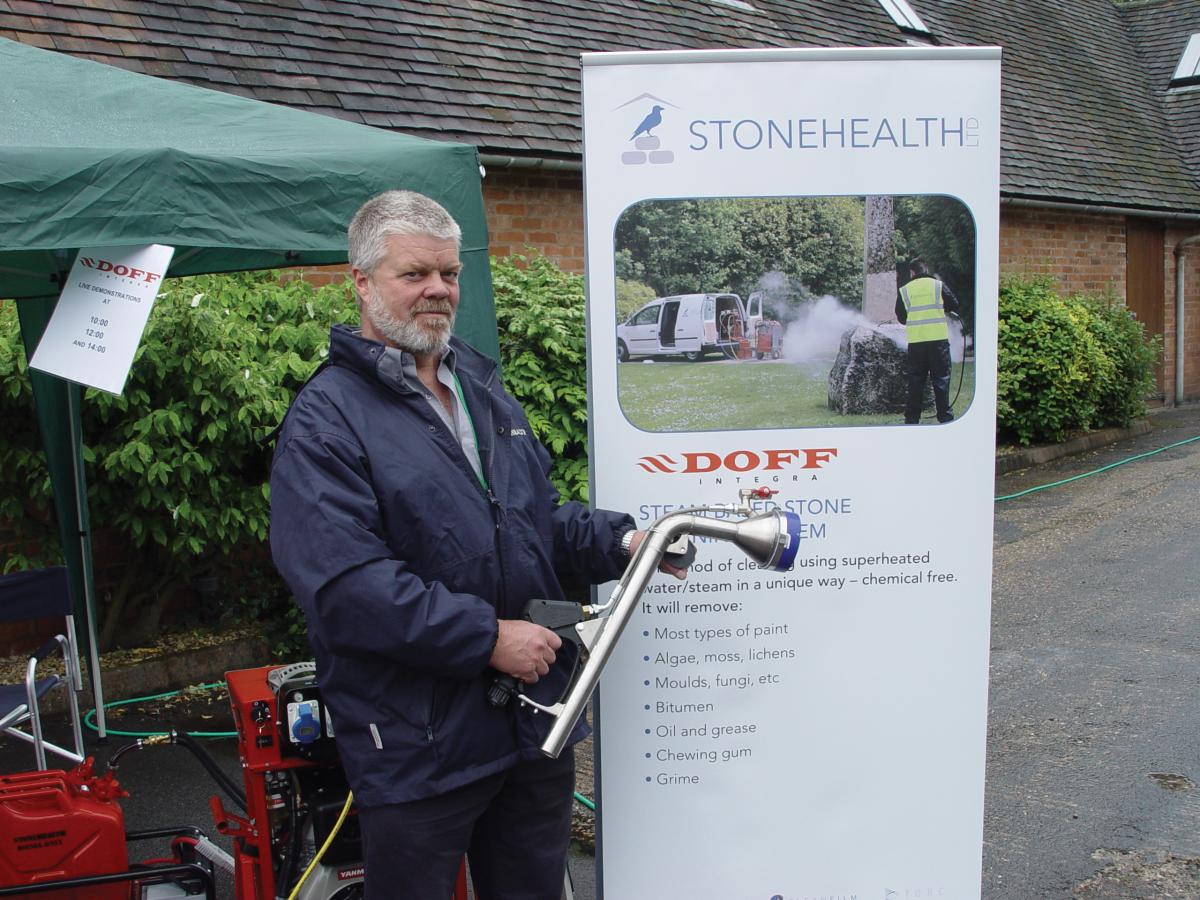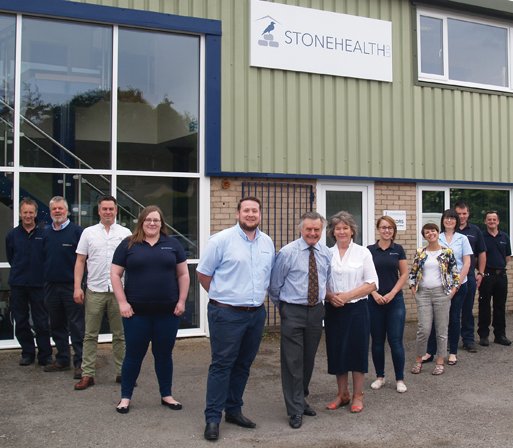Stone cleaning : Stonehealth
It was lucky for the stone cleaning sector that Brian Crowe, who was the Director of an Italian manufacturing company, wanted a new challenge and decided to look for other opportunities.
Stone cleaning has changed a lot in the past 30 years. That is due in no small part to the introduction by Brian Crowe of Stonehealth of the TORC (previously Jos) gentle abrasive system and then the DOFF superheated water cleaning system.
The success of the systems has seen the company expand over the years to the point where it had simply outgrown its centuries-old property in Dursley in Gloucestershire. So, with an eye on the future, James Diamond, the Senior Director who is Brian Crow’s deputy and nominated to become the future Managing Director, instigated the move into a bright new 700m2 building on a nearby industrial estate. The premises are more open and better organised, as well as accommodating the whole business under one roof instead of having a separate warehouse, giving significant logistical savings.
 Brian is less actively involved in the day to day running of Stonehealth these days but remains Chairman. He says of the move to the new premises: “Although we liked the character of the old place, our growth dictated we move to a modern building. I wouldn’t say it was traumatic, exactly, but it was different!”
Brian is less actively involved in the day to day running of Stonehealth these days but remains Chairman. He says of the move to the new premises: “Although we liked the character of the old place, our growth dictated we move to a modern building. I wouldn’t say it was traumatic, exactly, but it was different!”
Brian and his wife Eileen, who set up Stonehealth, are planning the company’s succession through a Trust, so everyone who works there has a share in its success, similar to the John Lewis Partnership. It means everyone gets a share of the profits and no individual is more important than the company. The founders’ son, Tim, says: “It’s a reward for what everyone’s done for the company.”
The move provided a much needed opportunity to reorganise production and dispatch. Phil Ellis, the Technical Director, says: “Stonehealth is no longer a cottage industry but a growing corporate body.”
Changes were needed just as they had been in the stone cleaning sector when Brian first entered it.
Stone cleaning had earned itself a poor reputation. Unskilled operators had managed to make a mess of buildings up and down the country with the inappropriate use of chemicals and sandblasting. As a result, many in the heritage sector had turned against any form of stone cleaning, with Historic Scotland leading the way.
During an exhibition in Frankfurt Brian called an ex-colleague and they met for lunch. After discussing Brian’s future, his colleague put an advertisement in a German newspaper asking for business ideas that could be developed in the UK and Ireland.
The responses were of varying degrees of practicality. One was a stone consolidant known as ZKF. That led to Brian Crowe meeting with the late Professor John Ashurst, one of the best known names in the heritage building sector, who, years later, was to describe Brian Crowe as the man who had cleaned up the stone cleaning industry.
The use of ZKF cannot be reversed and in conservation circles that is not acceptable. But by now Brian had become intrigued by the heritage sector and through ZKF met Dr Hartmann, the German promoting the Jos Cleaning system.
The novel element of Jos was a nozzle that created a gentle swirling vortex so that with little water, low air pressure, a safe inert fine granulate and a skilled operative even the most delicate surfaces could be cleaned without damage.
Brian took Jos straight into the lion’s den at a stone cleaning conference and exhibition in Edinburgh. Then he took it on tour, demonstrating it in Bristol, Birmingham, Manchester, London and Edinburgh. The heritage sector was enthusiastic.
By the end of the 1990s Jos had become the preferred method of stone cleaning for much of the heritage building sector and was routinely specified for sensitive projects.
Eventually, Dr Hartmann’s son took over the Hartmann company, which eventually went into liquidation. Stonehealth developed its own cleaning system under the name of TORC, which incorporated improvements to the original Jos. This has continued to evolve over the years.
When English Heritage bought Jos for the training centre it then ran at Fort Brockhurst its future was assured. And when Stonehealth moved on to TORC, so did Fort Brockhurst.
A second major breakthrough in low pressure masonry cleaning came with the development of the DOFF superheated water system, with water up to 150ºC at the nozzle cleaning effectively and, again, without damage.
These days, if it is being used on interiors it is often used with the DOFF Recovery System (DRS), which prevents interiors becoming saturated or filled with steam and leaving the cleaned surface dry.
DOFF is impressively efficient. It will remove many kinds of paint, moss, algae, fungi and other biological matter, killing off spores so the surface remains free of organic matter for a sustained period. This means there is no need to use a chemical biocide.
A few years ago, Phil Ellis was tasked with improving DOFF. After consulting at length with customers, staff and suppliers, the result is the new DOFF Integra, with its integral, light weight all-in-one design making it easily transported and manoeuvered. It has a quick release fuel can, non drip pipes, built in fuel bunding, quick release water hoses and digital displays.
Lately, Stonehealth has also relaunched TORC, which now has a competitively priced air powered pump and air cooler, which means no electrical supply is required. This makes TORC easier to use, especially to produce a conservation clean that retains the patina of age, if that is what is required.
Phil has also been working on a diesel power unit for the DOFF, which should be available by the time you read this. And he is working on other developments.
Stonehealth emphasises the importance of its products being used by trained operatives and it runs training sessions for its customers. It is also important to maintain the machines. This is why Stonehealth introduced its Rosette Scheme of Approved Contractors. A Stonehealth Approved Contractor will only use operators who have undergone Stonehealth’s in-house induction. Its machines will be serviced at least once a year and any replacement parts will be genuine spares from Stonehealth. TORC Contractors are obliged to use Stonehealth approved granulates only. And Stonehealth restricts the hire of its machines to contractors who already have genuine TORC and DOFF systems.
That is why Stonehealth suggests that anyone having a building cleaned using TORC or DOFF should ask to see the contractor’s Rosette ID Card and to check its period of validity. If there is any doubt about it, you can always check with Stonehealth before awarding the contract. Or visit the website www.stonehealth.com where the Rosette Approved Contractors are shown on a map.
Stonehealth is also on permanent display at the National Self Build & Renovation Centre (NSBRC) in Swindon.
A final point, although TORC and DOFF are good and will remove more than 90% of unwanted matter, there might be a need to use poultices, latex or other cleaning methods, which Stonehealth can also supply.
The company is happy to be consulted about cleaning projects and to trial-clean sample areas to assist clients and specifiers in their development of cleaning regimes.

